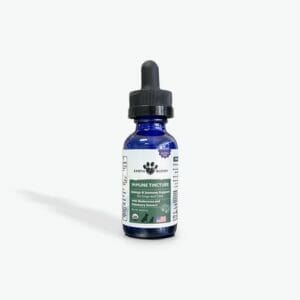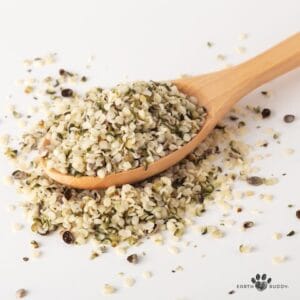
Can dogs eat elderberries? Elderberries are not generally considered safe for dogs, but there are some exceptions to this rule. Elderberries can be quite beneficial to your dog’s health when provided properly.
Can Dogs Eat Elderberries in the Wild?
You can find elderberry plants and their deciduous shrubs at your local park or in your backyard. They’re the fruit of the Sambucus tree (Sambucus nigra), commonly found in North America and Europe.
Dogs tend to enjoy eating berries off the trees, but they shouldn’t consume elderberries off the elderberry tree due to the possibility of elderberry poisoning. Raw elderberries and other parts of the elderberry plant, such as the leaves, bark, and roots, contain cyanogenic glycosides, which can release cyanide when ingested and can be toxic to dogs.
Cyanide toxicity is a serious issue, and if you believe your dog has eaten elderberries, you should call poison control and your veterinarian. Just as a side note, apple seeds also contain cyanogenic glycosides that could result in cyanide poisoning if your dog eats enough of them.
Even the ripened berries may not be completely safe and could result in elderberry poisoning. The average person’s perception of what is ripe might not match what a professional considers to be sufficiently ripe. Because of this, it’s essential that a reputable and trustworthy source prepare them properly.
Identifying Wild Elderberry Plants
Since wild, unripened elderberries are toxic, it’s important to gain an understanding of what they look like. Elderberry shrubs typically have compound leaves with 5 to 9 leaflets arranged in opposite pairs along the stem, with one leaflet at the tip. The leaflets are usually lance-shaped or elliptical, with serrated edges.
The elderberry flowers are small, creamy-white, and arranged in flat-topped or slightly rounded clusters called corymbs or umbels. These flower clusters can measure 3 to 10 inches in diameter and usually bloom from late spring to early summer, depending on the location and climate.
As for the elderberries themselves, they are small, round, or slightly oval fruits, typically measuring about 1/8 to 1/4 inch in diameter. They grow in clusters and unripened berries start off green before turning dark purple or black when fully ripe. The ripe berries usually appear from late summer to early autumn.
Sutherland Gold Elderberry Trees
Be sure not to confuse the common elderberry bush with the Sutherland Gold Elderberry plant. The Sutherland Gold Elderberry (Sambucus racemosa) is primarily grown as an ornamental plant due to its attractive golden-yellow foliage and red berry clusters. While it shares some similarities with the more commonly known black elderberry (Sambucus nigra), which is famous for its medicinal properties, the medicinal benefits of the Sutherland Gold Elderberry are less documented and not as well-established.
It is important to note that the red elderberry bush (Sambucus racemosa), including its cultivars like the Sutherland Gold Elderberry, contains higher levels of toxic compounds such as cyanogenic glycosides in its leaves, stems, roots, and unripe berries compared to the black elderberry (Sambucus nigra). Consuming these parts of the red elderberry bush can be toxic and cause adverse reactions in both you and your dog.
Elderberry Benefits for Dogs
When elderberries are properly prepared, they can be beneficial to your furry best friend. These small, dark berries are packed with nutrients that can contribute to the overall health and well-being of your canine companion.
They are rich in vitamins A, C, and B6, as well as minerals like potassium, iron, and calcium. These tiny berries also boast a high concentration of antioxidants, which can help protect the body against damage from free radicals and promote overall health.
Let’s dive deeper into the world of elderberries and how they can be beneficial.
The Benefits of Antioxidants
Antioxidants are abundant in elderberries. And antioxidants alone come with an array of benefits, including:
- Antioxidants have been shown to aid in the elimination of unstable oxygen molecules called free radicals
- Assists the body in combating environmental pollutants
- Helps reduce oxidative stress
- Supports normal bodily functions
Antioxidants in Elderberries
The most notable antioxidants found in elderberries include:
- Anthocyanins: These are a group of flavonoids responsible for the deep purple or black color of ripe elderberries. Anthocyanins have potent antioxidant properties and have been associated with a range of health benefits, including support for cardiovascular function and a healthy inflammatory response.
- Quercetin: This is another type of flavonoid found in elderberries, known for its antioxidant properties as well as its ability to help regulate inflammatory pathways. Quercetin is also known to help maintain normal histamine levels, support circulatory function, and support cognitive function.
- Rutin: A flavonoid glycoside, rutin has antioxidant properties and also has the ability to promote normal inflammatory pathways that may promote cardiovascular health, and support normal heart and vasculature functioning.
- Vitamin C: Elderberries are a good source of vitamin C, which is a powerful antioxidant that supports the immune system, supports collagen production, and supports normal detoxification processes.
- Vitamin A: This fat-soluble vitamin has antioxidant properties and is essential for healthy eye function, supporting the immune system, and promoting healthy skin.
- Phenolic acids: These compounds have antioxidant properties and can help protect the body against cellular damage caused by free radicals.
Immune System Support
As mentioned earlier, elderberries contain a variety of antioxidants, such as anthocyanins, quercetin, and vitamin C. These antioxidants can help protect the body’s cells from oxidative damage caused by free radicals, which may contribute to a stronger immune system.
Since elderberries also possess the ability to maintain healthy inflammatory pathways, they may also support a solid immune system. Chronic discomfort can weaken the immune system, leading to poor health. By reducing discomfort, elderberries could help your dog’s immune system work properly.
While elderberries may provide some immune system support, it’s essential to note that they should not be considered a standalone treatment for any illness or a substitute for a balanced diet and healthy lifestyle. Maintaining a strong immune system requires a combination of good nutrition, regular exercise, adequate sleep, and stress management.
Digestive Tract Health from the Elderberry Plant
Elderberries may provide some benefits for digestive health due to their nutrient and fiber content, as well as their antioxidant properties and ability to maintain normal inflammatory pathways. Here are some ways elderberries may support digestive health:
- Dietary fiber: Elderberries contain both soluble and insoluble fiber, which can help support healthy digestion. Soluble fiber attracts water and forms a gel-like substance in the digestive tract, which can help slow digestion and regulate blood sugar levels. Insoluble fiber adds bulk to stool, promoting regular bowel movements and preventing constipation.
- Antioxidant properties: The antioxidants present in elderberries, such as anthocyanins and vitamin C, may help protect the cells lining the digestive tract from oxidative damage. This can contribute to maintaining the integrity of the gut barrier and supporting overall gut health.
FAQ’s About Elderberries
To provide more insight into elderberries, here are some of the most commonly asked questions:
- Can dogs have elderberry gummies? No, dogs should not be provided with elderberry gummies. Even though elderberries are prepared properly in most gummies, there are significant amounts of sugar in elderberry gummies.
- Can dogs have elderberry wine? No, you should never provide your dog elderberry wine. Alcohol is incredibly dangerous for your dog.
- Can dogs have elderberry syrup? Some preparations of elderberry syrup are safe for dogs, but this must be used with caution and come from an experienced professional like a holistic veterinarian to prevent dog elderberry poisoning. Your holistic vet may even have a recipe for elderberry dog treats.
- Can dogs have elderberry extract? Yes, as long as it’s a quality product, dogs can have elderberry extract. Earth Buddy’s Maxx Life Glutathione and Immune tincture both contain elderberry extract.
- Are all elderberry products the same? No, all products aren’t the same. Supplements are highly unregulated so it’s important to vet the product before purchasing. Not only will this guarantee a good product, but it will also prevent elderberry poisoning, or cyanide poisoning, in your dog.
- Can dogs eat the entire plant if prepared properly? Scientists are unsure as to how to prepare the entire plant for its beneficial compounds at this time.
For further reading, we recommend:
- https://www.ncbi.nlm.nih.gov/pmc/articles/PMC4848651/
- https://bmccomplementmedtherapies.biomedcentral.com/articles/10.1186/s12906-021-03283-5
- https://www.sciencedirect.com/science/article/pii/S1756464614002400
- https://www.researchgate.net/publication/259696401_An_Evidence-Based_Systematic_Review_of_Elderberry_and_Elderflower_Sambucus_nigra_by_the_Natural_Standard_Research_Collaboration
You Might Also Enjoy
Learning how to calm a dog down is an essential skill to have in your…
Whole foods are integral to a dog’s diet, offering unprocessed, natural nutrients that promote and…
Hemp seeds, harvested from the hemp plant known as Cannabis sativa, have become known as…





